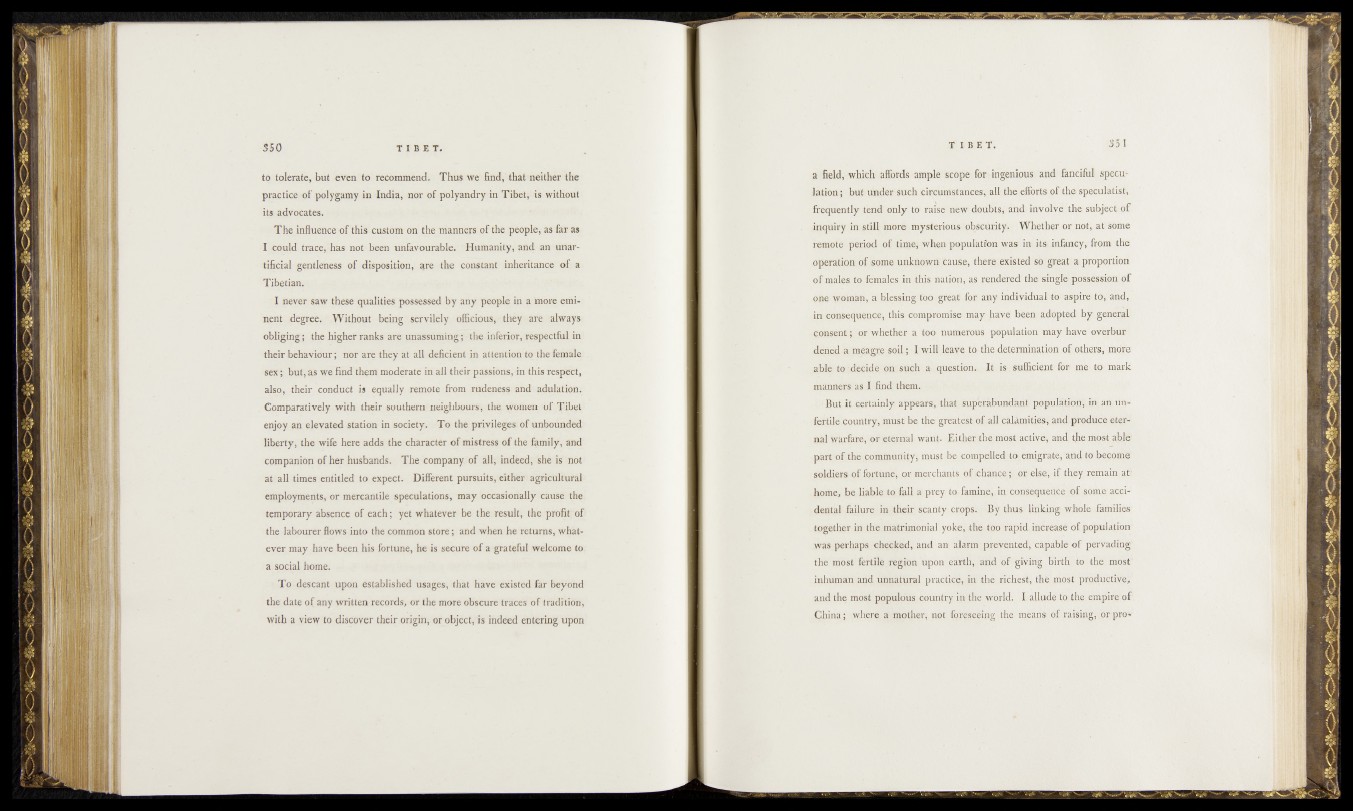
to tolerate, but even to recommend. Thus we find, that neither the
practice of polygamy in India, nor of polyandry in Tibet,- is without
its advocates.
The influence of this custom on the manners of the people, as far as
I could trace, has not been unfavourable. Humanity, and. an unartificial
gentleness of disposition, are the constant inheritance of a
Tibetian.
I never saw these qualities possessed by any people in a 'more eminent
degree. Without being servilely officious, • they are always
obliging ; the higher ranks are unassuming ; the inferior, respectful in
their behaviour ; nor are they at all deficient in attentionito the female,
sex ; but, as we find them moderate in ail their passions, in this respect,
also, their conduct is equally remote from rudeness and adulation.
Comparatively with their southern neighbours, the women of Tibet
enjoy an elevated station in society. To the privileges; of unbounded;
liberty, the wife here adds the character of mistress of the family, and
companion of her husbands. The company of all, indeed, she is not
at all times entitled to expect. Different pursuits, either agricultural
employments, or mercantile speculations, may occasionally causé the.
temporary absence of each ; yet whatever be the result, the profipofi
the labourer flows into the common store; and when he returns, whatever
may have been his fortune, he is secure of a grateful welcome to.
a social home.
To descant upon established usages, that have existed far beyond
the date of any written records, or the more obscure traces of tradition,
with a view to discover their origin, or object, is indeed entering upon
a field, which affords ample 'sscoplgtfor-ingenious; and fanciful speculation
; but under such «itGunistaijces^alKthe efforfis of thp speeqlatist,
frequently tend only i to- raise'neiv^dqubts, and involve- ther-subjecfcof
inquiry in still more-mysterious« obscurity. Whether op-ndt, at some
remote period of time, when population was invj-ts&infanoy* from the
operation of «some unknown-cause, there'existed‘so great s proportion
of males to females in this na;lf,on, as rendered the singM possession |3f
one woman, a.t$es§ingitbo-egreaf/or any. individual to aspire- top^itd,
iii consequence; this 'epmpfOmise may'-hstyg h ^ 4f-a<^0Pte^'- by .genqipb
consent; or whether a top-numerous pdpulaft^pia-yih||''(| overbur-1
dened a mqagre soil; I will leaye (tq the determination* of^&tfiers', mdse
able to>decide on. such a question*. - It insufficient fop me to'mark
manners as I find them.
But it certainly appears, that superabundant population1, in; an up-
fertile country, must be the greatest of all1 qal'amities^-and-. produce eternal
warfare, or eternal wan.t. Either the most^Ufe-,. and| tjhe most
part of the .community, musttlg.eompeUedito^emigrate^a.hdito-beGOfriW
soldiers of fortqnei or mei‘chants-'pfj;hanqe^e^'else, ifjjhpy, remains at*
home, be liable to fall a j$ey tq famine, in copsequenee^of, some« acct-*
dental failure in ,their scanty crops. By iffius linking whole-families'
together in the matrimonial yoke, the too rapid increase of population
was perhaps checked, and an alarm prevented; capable of pervading'
the most fertile region upon earth, and of1 giving birth;, to th.e‘ most'
inhuman and unnatural practice, in the richest, th^jmost productive;
and the most populous country in the wqfld. I.-alljdffe tbUhe e.mpire'of’
.Qhina; where a mother, not fqrepeeba-g ■ tf;e‘ means; of raising, ^orpro*'